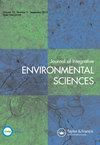Farmers' perceptions of climate change and the proposed agriculture adaptation strategies in a semi arid region of south India
IF 3.5
4区 环境科学与生态学
Q3 ENVIRONMENTAL SCIENCES
Journal of Integrative Environmental Sciences
Pub Date : 2016-01-02
DOI:10.1080/1943815X.2015.1062031
引用次数: 90
Abstract
Climate change is recognised as one of the leading challenges affecting the performance of agriculture and the livelihood of people. Farmers are the hardest hit as they have to continuously respond to climatic variations. In order to understand farmers' perceptions of climate change and its impacts, and to identify adaptation needs, focus group discussions and semi-structured questionnaire surveys were carried out at the end of the south-west monsoon season in 2012 (Kharif cropping season in India). This helped to gather their immediate responses soon after the poor performance of south-west monsoon 2012. Khariff cultivation is locally known as ‘Kuruvai’ and is always under the influence of the south-west monsoon rainfall. Farmers' have perceived climate variability, and identified increasing temperature, delayed onset, intermittent dry spells and decreasing soil moisture as the critical factors affecting their cultivation. Some of them have started to adapt to these changes by cultivating only short-duration crops such as pulses, vegetables and flowers especially jasmine, but there is also a trend to put more land under fallow and abandoning the major cereal production. This study reveals that the farmers' perceptions are in accordance with the real trends analysis done on meteorological variables using Mann–Kendall test and Sens's slope estimator test, but not exactly matches with rainfall. Farmers have indicated their specific adaptation needs, a number of which could be incorporated into site-specific adaption strategies and policies.印度南部半干旱地区农民对气候变化的看法和拟议的农业适应策略
气候变化被认为是影响农业绩效和人民生计的主要挑战之一。农民受到的打击最大,因为他们必须不断应对气候变化。为了了解农民对气候变化及其影响的看法,并确定适应需求,在2012年西南季风季节(印度的Kharif种植季节)结束时进行了焦点小组讨论和半结构化问卷调查。这有助于在2012年西南季风表现不佳后不久收集他们的即时反应。卡里夫种植在当地被称为“Kuruvai”,总是受到西南季风降雨的影响。农民已经意识到气候变化,并确定温度升高、延迟发作、间歇性干旱和土壤湿度下降是影响其种植的关键因素。他们中的一些人已经开始适应这些变化,只种植短周期作物,如豆类、蔬菜和花卉,尤其是茉莉花,但也有一种趋势,使更多的土地处于休耕状态,放弃了主要的谷物生产。研究表明,农民的感知与Mann-Kendall检验和Sens斜率估计检验对气象变量的真实趋势分析一致,但与降雨量不完全匹配。农民已经表明了他们的具体适应需求,其中一些需求可以纳入特定地点的适应战略和政策。
本文章由计算机程序翻译,如有差异,请以英文原文为准。
求助全文
约1分钟内获得全文
求助全文
来源期刊

Journal of Integrative Environmental Sciences
ENVIRONMENTAL SCIENCES-
CiteScore
3.90
自引率
0.00%
发文量
13
审稿时长
>12 weeks
期刊介绍:
Journal of Integrative Environmental Sciences (JIES) provides a stimulating, informative and critical forum for intellectual debate on significant environmental issues. It brings together perspectives from a wide range of disciplines and methodologies in both the social and natural sciences in an effort to develop integrative knowledge about the processes responsible for environmental change. The Journal is especially concerned with the relationships between science, society and policy and one of its key aims is to advance understanding of the theory and practice of sustainable development.
 求助内容:
求助内容: 应助结果提醒方式:
应助结果提醒方式:


